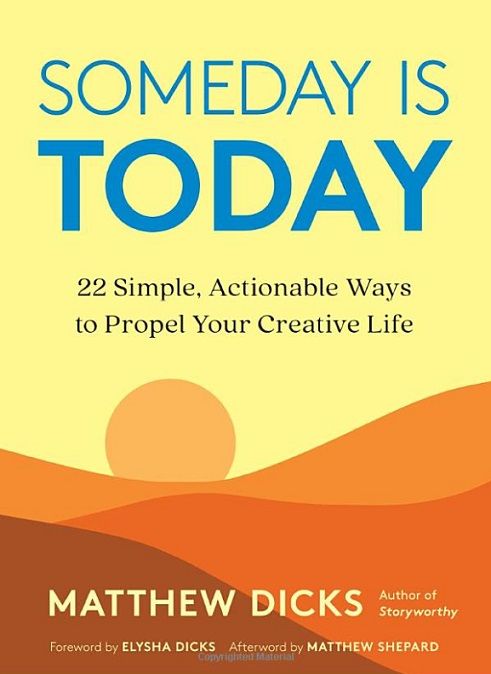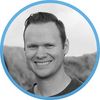Someday Is Today - A Book That Recently Changed My Life
Work/Life balance? What's that?

The Mindset Shift to Getting More Done
“I don’t have time”. “I’m too busy”.
Have you said those words yet today? Maybe yesterday? I bet you probably have within the last week or so. Odds are last time you spoke with a friend or family member you talked about how busy you are. I know I have.
I’ve always tried to make the most of my time wherever possible; but with an endless list of things to do, how do you pick what gets your time, and what doesn’t? There seems to be an endless list of apps, systems, and programs that claim to help you “get your time back!” or “be more productive than ever!” and yet that doesn’t make the task of actually being more productive more simple.
Is Balance Possible?
These days talk a lot about “work/life” balance but everyone seems to have a slightly different definition of it. What does ‘balance’ even mean anymore? By strict definition, balance means an equal amount. If we are talking about time, this could presumably mean that the amount of time you spend at work is roughly the same amount of time that you get to spend with family, or doing other things that are “not work”.
However, popular culture (or is it just “business” culture?) also states that if you want to get ahead or be successful in business, you have to put in lots of hard work, extra hours, hustle, climb the ladder, blah blah blah.
Mr. Burns from The Simpsons sums it up nicely:

“I’ll keep it short and sweet: Family. Religion. Friendship. These are the three demons you must slay if you wish to succeed in business!” - C. Montgomery Burns., The Simpsons, Season 8, Episode 21 - The Old Man and the Lisa
Wherever you look, it appears that the most successful business people frequently devote all their time and attention to their careers. The philosophical discussion of whether that is a good thing or not is a topic for another time, but my question is this: is it possible to do everything within balance and still be successful professionally?
Making More Time
Like so many, I’ve got several things demanding my time frequently. Currently, I work full-time as a software engineer, I have four kids aged 5 months to 9 years old, a wife, and a dog. Besides making time for them (my daughter is sitting on the floor coloring with me as I write this) I also have a house to maintain - keeping it tidy, and the regular work that comes with home ownership (especially the furnace as we go into winter).
Other things I’m doing include writing and recording lectures for an online class I will be instructing for the university I teach at starting in January. I do woodworking on the side for fun and have a new top for a desk sitting in my garage awaiting some staining. Once that’s done, I’ve got a hundred coats of finish to put on it so it can survive being a kid's work desk (not actually a hundred coats… but maybe).
That’s just a sample of some of the things I’m trying to do all at once. It’s not easy. How do you pick what to do when there is time to do anything? Can I just find more time?
I’ve already done all of the “obvious” things that experts mention. Reduce time on social media. Done - I never really got into social media so it was never an issue - I probably spend 5-10 minutes a day glancing over Twitter or LinkedIn.
I’ve also never been one to watch much tv. Sure, I’ll catch an episode of a documentary now and then with my wife, and we’re both looking forward to the next season of The Mandalorian, but besides that - the only other TV time I have is with my kids watching an episode of The Magic School Bus that we’ve all seen a hundred times.
I didn’t have any more time in a day to make without taking time away from something.
The Mindset Shift
Then one day, while working in the garage, I struck gold.
I often listen to podcasts while I’m working on something that doesn’t demand all of my concentration. Woodworking is a great example of that or yard work like weeding or mowing the lawn. These are all things I enjoy doing because physical labor is a welcome change from the creative efforts of my daily work as a software engineer. One of my favorite podcasts is hosted by a gentleman named Brett McKay who runs an online men’s lifestyle magazine called The Art Of Manliness. In this particular episode, entitled "Tactics and Mindset Shifts for Making the Most of Life” (Episode #825) he interviewed an author named Matthew Dicks to talk about his new book: Someday Is Today.
This podcast was impactful enough that I got a copy of the e-book before I’d even finished the podcast, and I started reading the book that night while I was putting my two-year-old to bed.
Immediately in the forward of the book (written by the author’s wife), I found exactly what I had been searching for these many months since I first started thinking about being able to do ‘everything’ without sacrificing what really matters:
If you want to be productive and accomplish your goals, it’s a given that you will have to work hard. However, you do not need to sacrifice your family time, your fun time, or your health to do it. - Someday is Today, Foreward
Finally - Somebody figured out how to do it!

Someday Is Today
Matthew Dicks is a storyteller, communications consultant, writer, and schoolteacher. He is also a husband and father. While he and I don’t wear all the same hats, we share several of them - most notably “teacher”, “husband” and “father” - what I consider the most important hats that I wear.
It may be a bit cliché to say it, but I rank this book in the category of life-changing. There is no way that I can do the book justice by just writing a few things about it, but I will highlight the things that had the most impact on me, in the hopes that it will help somebody else who, like me, always has way more things to get done that they ever could hope to.
The One-Hundred-Year-Old-Plan
Because I constantly make my to-do list so long, I sometimes would have a hard time figuring out which items to tackle first. There are deadlines for things at work. There are deadlines for things around the house (sometimes self-imposed), and I have four kids that are getting older by the second. Which do you give the most priority to? I think we all instinctively want to say “your kids”, but have you ever had to make that decision while in the thick of work? Have you had to make that decision when you’ve already spent some time with them, and they come back for more?
Turns out, Dicks has the same problem I do:
Whenever I need to make a decision - monumental or minuscule - I no longer rely upon the current version of myself to make that decision. I have discovered that I am an unreliable, ineffective decision maker in the moment, because I often base my decisions upon my feelings, thoughts, and desires in that moment. I do the thing that makes me happy now - which is sometimes perfectly acceptable and advisable - but is often times shortsighted and counterproductive. Instead, when I need to make a decision, I try to look to the future. I look to the one-hundred-year-older version of myself. The version of myself near the end of his life. - Someday is Today, Chapter 1
I love this. The one-hundred-year-old version of me has the perspective that I will never have until I become him one day. This person knows what it’s like to look at death. This person will know, for better or for worse depending on my choices now, what the best decision I could make at the moment is.
What would that person that is preparing to die want me to do? If I want to live a meaningful, productive, fulfilling life, I cannot base my decisions only on what I’m feeling in the moment.
So, if I’m sitting at my desk writing, grading class projects, or even just reading a book, and one of my kids wants me to come play a game with them, what do I do? The work needs to get done - it always needs to get done. When this happens, I ask the one-hundred-year-old version of myself what I should do at that moment. One day, that two-year-old that looks up at me with arms stretched out to pick him up while saying “Dadn!” (he always adds an ‘n’ to the end of ‘Dad’) will no longer want me to hold him. One day my nine-year-old won’t come to ask to play Legos or board games with him anymore. One day, my 5-month-old won’t smile at me with his toothless smile anymore. Because the one-hundred-year-old me knows these things, I pick the kids every time.
Again, we generally know that’s what we should be doing. It’s just that during the thick and thin of life, so many other shortsighted things take our attention and always feel more important at the moment. Having my one-hundred-year-old self tell me what to do is incredibly liberating.
Say Yes
Practice the art of saying “Yes”. This goes in hand with what the one-hundred-year-old plan teaches us to do. Somebody may come to you one day with a completely random idea and wants to get your help with it. What do you tell them? You’re too busy with everything else you’ve already got doing on in your life? Or do you just take the plunge having no idea what you are getting yourself into? We can’t see the future - we have no idea where we are going to end up, or what kinds of things are going to help us get there. Will it be worth your time? Will it benefit you somehow in the future?
Who knows. But I have started saying yes every time.
Steve Jobs, the late co-founder of Apple Computers gave a commencement speech at Stanford in 2005 where he gave a great example of how we don’t know what’s coming, and we can only understand how we got there by looking back.
“Because I had dropped out [of college] and didn’t have to take the normal classes, I decided to take a calligraphy class ... I learned about serif and sans serif typefaces, about varying the amount of space between different letter combinations, about what makes great typography great. It was beautiful, historical, artistically subtle in a way that science can’t capture, and I found it fascinating. None of this had even a hope of any practical application in my life. But ten years later, when we were designing the first Macintosh computer, it all came back to me. And we designed it all into the Mac. Of course it was impossible to connect the dots looking forward, when I was in college. But it was very, very clear looking backwards ten years later.” - Steve Jobs, 2005
I’ve always been a planner, and not knowing the “point” of something has always made it difficult for me to want to do something. If I can’t see “why” or “how” something would be “useful”, I don’t usually want to do it. That person died after reading Someday is Today. Now, I say yes all the time. Mostly it’s to myself about doing something I’ve never tried before. Like writing this blog, for example.
I see the attitude of ‘planning’ all the time with my university students. I was once one myself. They’ve been conditioned by the education system to push towards a specific goal - graduation generally - and they should streamline the process to only do what is necessary to get that piece of paper that they think will be the grand gateway to everything else in their lives.
Spoiler alert my friends, the diploma is not that big of a deal. Out in the business world, results are more important than credentials. Sure, a degree may get you looked at, but unless you’ve got something to back up that piece of paper, it’s not going to get you as far as you think it will on its own. This is why we have the ridiculous notion of students begging the US government right now to erase all their student loans because their university studies alone didn’t make them millionaires.
Luckily for me, saying ‘yes’ was already somewhat engrained in me. I met two specific individuals second software job where I worked as a web developer. One day, one of them approached and asked if I would like to help him and another colleague with a web application they are working on for sports team management. I don’t care for sports. I’ve never followed any teams. I played Lacrosse in high school, but I mainly did that because of the friends I had doing it. Why should I be interested in spending hours and hours working on a project that I probably won’t have any inherent interest in?
I said yes anyway.
Because I said yes, I developed three new lifelong friends while we worked on the project together. We have all remained in contact for over ten years now, even though we aren’t working on that app anymore. One of those friends, Garrett, randomly reached out one day in 2018 to ask if I wanted a job on his team where he was working at the time. The interview process at this new company was the easiest one I’ve ever experienced. One of the interviewers said to me “Well, this is the part of the interview where we’d ask you some programming questions, but Garrett says you’re good and we trust him, so instead what would you like to talk about?”
Fast forward four and a half years, and not only have I been working at this company, but I also made an internal move to a new team that was led by the same colleague that was interviewing me in the first place. She and I have now become good friends as well, and I couldn’t ask for better managers.
I attribute the fact that my career is currently the best that it has ever been to saying ‘yes’ to building that sports app all those years ago.

Make Something Into Something
I have been building and tinkering with computers since I was young. One of my proudest moments was when I took my computer to a LAN party at one of my friend’s houses (back when those were far more popular). My dad had gotten my brother and me matching “barebones” PCs, a computer with nothing but the bare minimum of hardware in it. I had to add the storage, memory, and graphics card, and install the operating system myself. My friends had recently purchased “top of the line” machines from a big box store on a black Friday sale. They had all the good-looking specs when compared to my home-built machine. When we fired our computers up though, it was pretty telling what my efforts had gained me. My computer ran circles around all of theirs, despite having a “slower” processor.
The thought that I could build something that worked so well was amazing.
I have loved the art of creativity for as long as I can remember. When I programmed my first “hello world” application* back in 2008 something awoke in me. I created that from nothing. I opened a blank file, wrote some code, and the computer ran it. Eventually, I changed my major from Computer Engineering to Computer Science because the software world was suddenly of huge interest to me. All because I could, like an artist, take a blank canvas and create something from nothing.
As creative people, we must be the collectors, the preservers, and whenever possible, the transformers and expanders of our ideas and content. We need to be supremely flexible in terms of how we view the path of our creative life and the things that we make. When we learn to unshackle our ideas form their original conceptions and allow them to collide with the world, we can find ways to transform them into something new, and the results can be extraordinary. - Someday is Today, Chapter 19
Making something from nothing is miraculous. This is why I think games like Minecraft are so addictive and popular - the act of creation is so invigorating that we want to do it over and over again. However, making something is hard. That may be why it appears that there are so many more consumers than there are creators. Sure, it may not look like it when you look at the number of Instagram accounts or YouTube channels, but I don’t believe that is the case at all.
If you have never tried creating something, please give it a try. Create anything! It can be something as simple as cooking breakfast from scratch instead of putting frozen waffles in a toaster. Get a Lego kit and put it together. Heck, just rearrange the furniture in a room in your home.
Making things is one of the most rewarding things we can do as human beings. It seems baked into our DNA. Sadly, the ‘effort’ of such things often prevents us from gaining the satisfaction that comes with creation. Do yourself a service, and start creating a little more and consuming a little less.
Worth the Read?
Do you want my opinion?
You should read Someday is Today.
I have gained so much more perspective from its pages. One unexpected benefit I gained from the book is that I find myself less stressed. Sure, the deadlines are still there, I still have four kids that constantly vie for my attention, and I am still teaching university classes alongside working a full-time developer job. My workload has not changed. What has changed is the way I look at things now. If I’m in the middle of work and my two-year-old comes to share some marshmallows with me, work gets put on hold until the marshmallows are gone. If my 5-month-old baby is crying because his mother is in the middle of baking bread, I’ll pick him up and bring him to my zoom meetings. With the camera on. Everybody gets to see his chubby face while I speak. I do all this because I know that the one-hundred-year-old version of me will be proud of the current version of me.
Anytime a suggestion or request comes up, I nearly always say yes. Stay up late playing computer games with my brothers? Even though I’ll be sleepy the next day during work? Yes. Every time. Two days later, I’m will not remember that I was tired. But I will remember that my face hurt from laughing for two hours straight because that’s generally what happens when my brothers and I get together.
Matthew Dicks has all kinds of tips and tricks for being more productive - and they are valuable to be sure. I’ve implemented several of them myself to great effect. However the most important part of this book for me was the mindset shift that it invoked in me - it’s made me a better person.
I think it will do the same for you.
*” Hello, world” is the traditional program that many new developers create when they first start programming. It is nothing more than the computer writing the words “Hello, world” to the screen, but it is important because it shows that you have written the code correctly.

